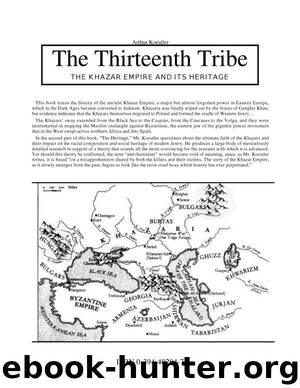Thirteenth Tribe The Khazar Empire and its Heritage by Arthur Koestler

Author:Arthur Koestler
Language: eng
Format: epub
Tags: Thirteenth Tribe; Invention of the Jewish People; Jew; Jews; Jewish; Israel; Tribes of Israel; Khazar Kingdom; Khazaria Empire; Palestine; Judaism; Khazaria; Khazar; Zionism; Anti-Semitism; Jewish History;ADL;Anti-Defamation League;Anti-Semitism
Publisher: Open Source
We find this pattern repeatedly in chronicles: in Treves, in Metz, and many other places. By the time of the second and later crusades, it had become almost a routine: "At the beginning of the agitation for a new crusade many Jews of Mayence, Worms, Spires, Strasbourg, Wiirzburg and other cities, escaped to neighbouring castles, leaving their books and precious possessions in the custody of friendly burghers." One of the main sources is the Book of Remembrance by Ephraim bar Jacob, who himself, at the age of thirteen, had been among the refugees from Cologne in the castle of Wolkenburg.' Solomon bar Simon reports that during the second crusade the survivors of the Mayence Jews found protection in Spires, then returned to their native city and built a new synagogue. This is the leitmotif of the Chronicles; to repeat it once more, there is not a word about Jewish communities emigrating toward eastern Germany, which, in the words of Mieses, was still Judenrein — clean of Jews— and was to remain so for several centuries.
The thirteenth century was a period of partial recovery. We hear for the first time of Jews in regions adjacent to the Rhineland: the Palatinate (AD 1225); Freiburg (1230), Ulm (1243), Heidelberg (1255), etc. 18 But it was to be only a short respite, for the fourteenth century brought new disasters to Franco-German Jewry.
The first catastrophe was the expulsion of all Jews from the royal domains of Philip le Bel. France had been suffering from an economic crisis, to the usual accompaniments of debased currency and social unrest. Philip tried to remedy it by the habitual method of soaking the Jews. He exacted from them payments of 100000 livres in 1292, 215000 livres in 1295, 1299, 1302 and 1305, then decided on a radical remedy for his ailing finances. On June 21, 1306, he signed a secret order to arrest all Jews in his kingdom on a given day, confiscate their property and expel them from the country. The arrests were carried out on July 22, and the expulsion a few weeks later. The refugees emigrated into regions of France outside the King's domain: Provence, Burgundy, Aquitaine, and a few other frudal fiefs. But, according to Mieses, "there are no historical records whatsoever to indicate that German Jewry increased its numbers through the sufferings of the Jewish community in France in the decisive period of its destruction". And no historian has ever suggested that French Jews trekked across Germany into Poland, either on that occasion or at any other time.
Under Philip's successors there were some partial recalls of Jews (in 1315 and 1350), but they could not undo the damage, nor prevent renewed outbursts of mob persecution. By the end of the fourteenth century, France, like England, was virtually Judenrein.
The second catastrophe of that disastrous century was the Black Death, which, between 1348 and 1350, killed off a third of Europe's population, and in some regions even two-thirds. It came from east Asia via Turkestan, and the way it was let loose on Europe, and what it did there, is symbolic of the lunacy of man.
Download
This site does not store any files on its server. We only index and link to content provided by other sites. Please contact the content providers to delete copyright contents if any and email us, we'll remove relevant links or contents immediately.
| Africa | Americas |
| Arctic & Antarctica | Asia |
| Australia & Oceania | Europe |
| Middle East | Russia |
| United States | World |
| Ancient Civilizations | Military |
| Historical Study & Educational Resources |
Room 212 by Kate Stewart(4736)
The Crown by Robert Lacey(4572)
Endurance: Shackleton's Incredible Voyage by Alfred Lansing(4504)
The Iron Duke by The Iron Duke(4122)
The Rape of Nanking by Iris Chang(4022)
Killing England by Bill O'Reilly(3897)
Joan of Arc by Mary Gordon(3782)
Say Nothing by Patrick Radden Keefe(3725)
I'll Give You the Sun by Jandy Nelson(3272)
Shadow of Night by Deborah Harkness(3174)
Hitler's Monsters by Eric Kurlander(3164)
Mary, Queen of Scots, and the Murder of Lord Darnley by Alison Weir(3064)
Blood and Sand by Alex Von Tunzelmann(3055)
Darkest Hour by Anthony McCarten(3018)
Margaret Thatcher: The Autobiography by Thatcher Margaret(2971)
Eleanor & Park by Rainbow Rowell(2943)
Red Famine: Stalin's War on Ukraine by Anne Applebaum(2816)
Book of Life by Deborah Harkness(2717)
The One Memory of Flora Banks by Emily Barr(2684)
